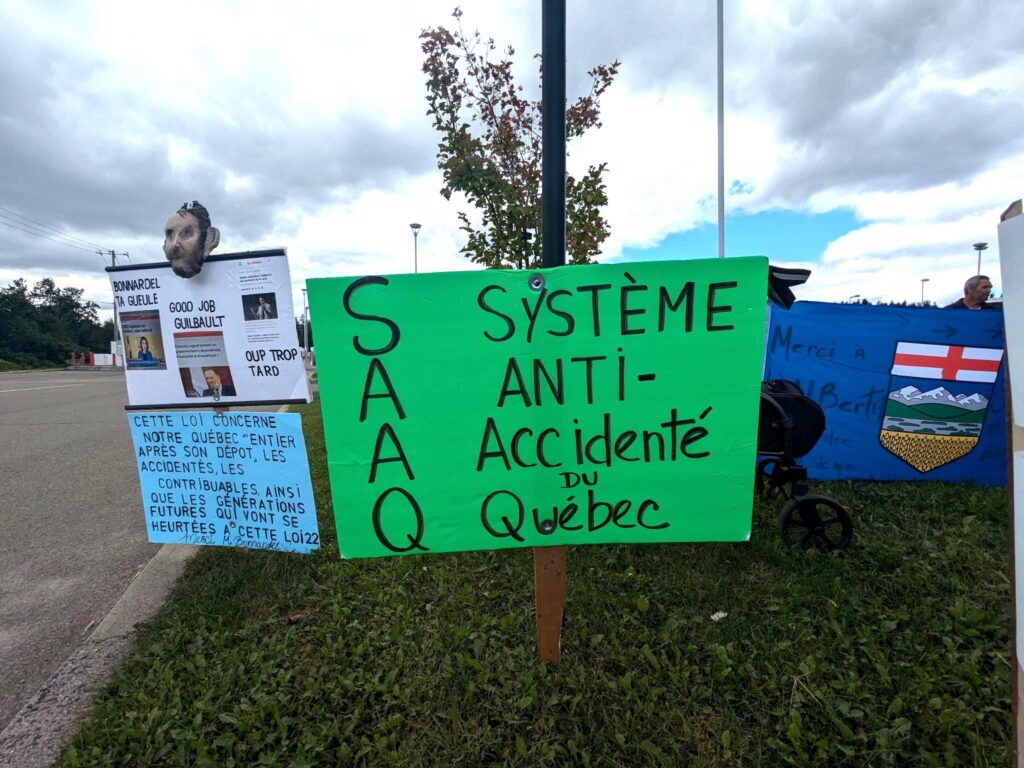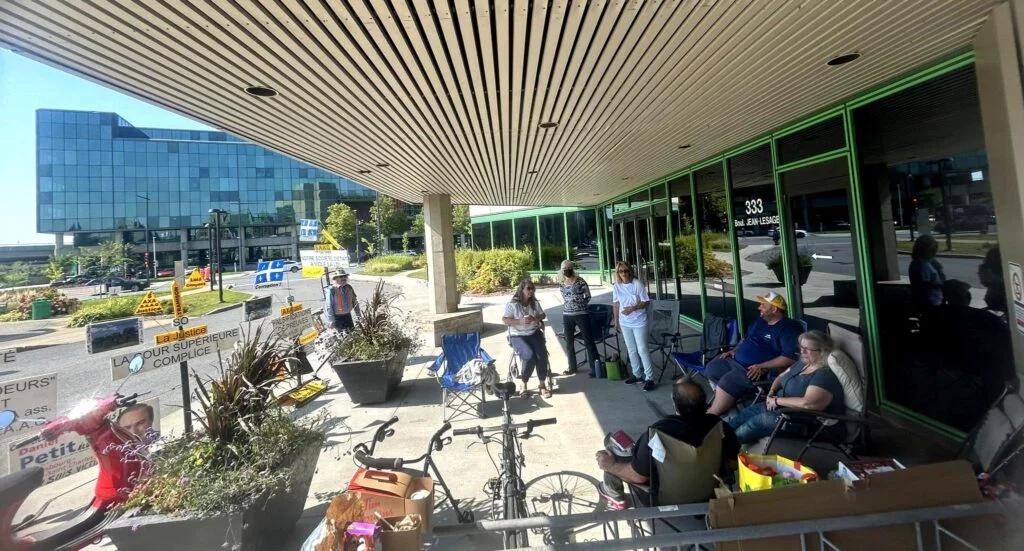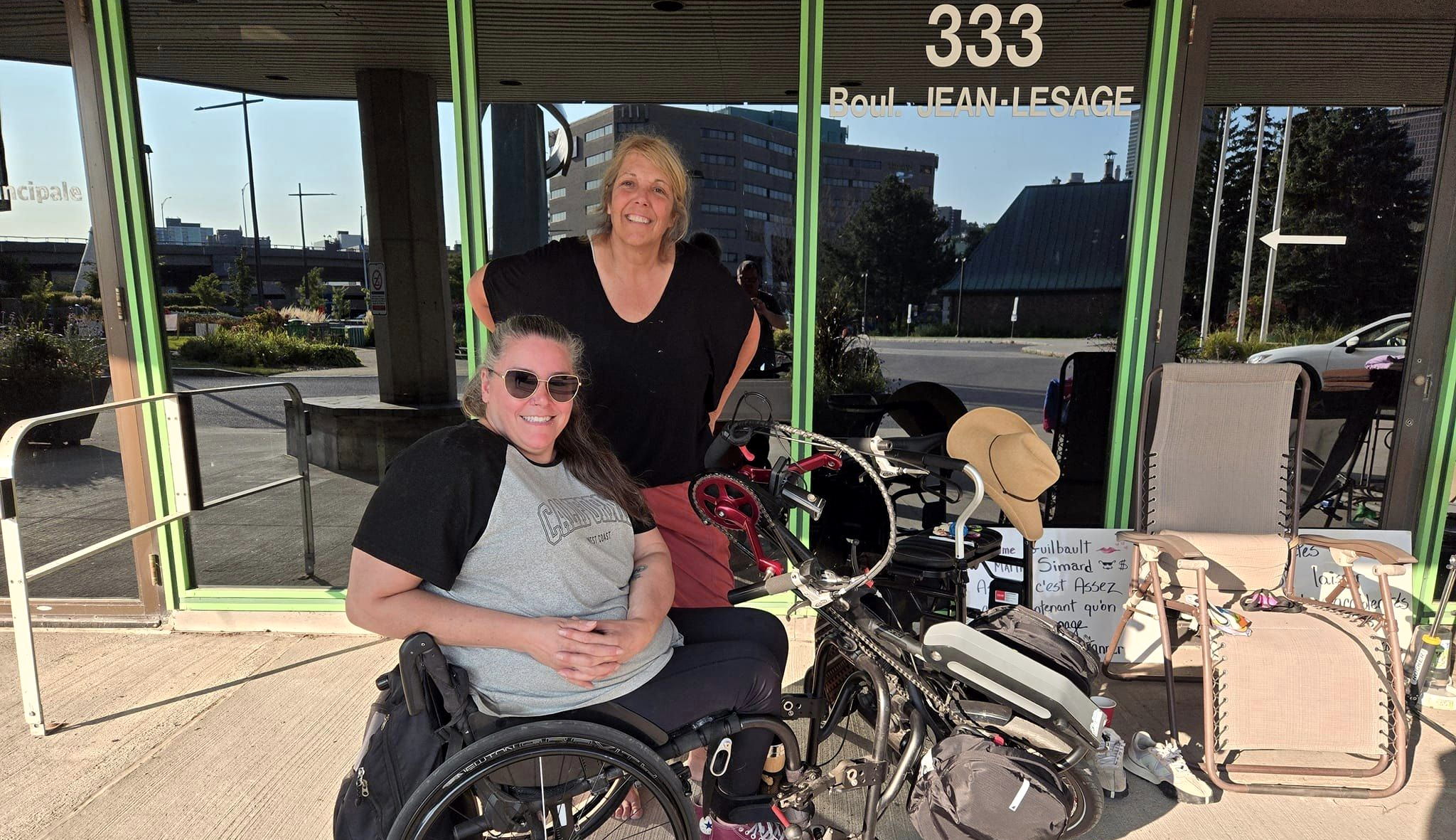Quebec's public automobile insurance company is increasingly using intrusive, even aggressive, methods to monitor victims of road accidents. Such is the case for Lise, a Quebec woman who was hit by a car as a pedestrian. Since the event, she has faced an obstacle to her recovery: surveillance by the Société de l'Assurance Automobile du Québec (SAAQ).
Lise is one of a dozen members of the Association des Accidentés de la Route Victimes de la SAAQ (AARVS) who have been protesting day and night since Tuesday, September 3, in front of the head office of the state-owned company. North Star went to meet them.
An astonishing story
Following her accident, the SAAQ classified Lise's ability to move (“locomotion”) as “severity 3” on its internal scale, entitling her to a small allowance. After six years and a longer-than-expected recovery, Lise returned to Alberta, where her daughter still lives.
She continued to receive treatment under the SAAQ, but after consulting several doctors, she says she contested her classification with the Quebec Adminstrative Tribunal. In the end, she obtained a “severity 4” classification, which gave her access to better benefits.
Shortly afterwards, she says she began to feel that she was being watched. This feeling of being watched coincided with subtle threats from the SAAQ, which sometimes threatened to cut off her benefits.
Agents hired by the SAAQ began to follow Lise's movements, watching for the slightest mistake that might demonstrate that she was exaggerating her condition. They filmed her in the grocery store, on the street and even in front of her home.
Lise is not alone in this pressure. In recent years, the Crown corporation has significantly increased its shadowing costs. Radio-Canada reported that, by 2021, tailing had cost taxpayers a total of $216,700. It is impossible to know how much money the SAAQ spent in 2024. However, we do know that the amount spent increased by 40% between 2019 and 2021.

These investigations are generally entrusted to private firms and are, according to SAAQ's internal guidelines, supposed to be used as a last resort. However, in Lise's case, it would appear that it was the intensity of the litigation and the desire to save money that motivated the use of this method.
What's more, the consequences of surveillance, over and above the high costs, can be devastating. For Lise, the constant surveillance has worsened her psychological state. "They've destroyed me so much that I'm even more debilitated. Now I don't think I'm a Severity 4 anymore. I'm worse."
The stress generated by the surveillance has plunged her into a vicious circle of fear and anxiety, she explains. She even developed post-traumatic stress, not because of the accident, but because of the SAAQ investigations. She is seeing a psychologist for this disorder.
"It's harassment," she exclaims, recounting an episode in which an SAAQ agent had followed her to the airport, trying to prove that she was faking her condition.
"Once, I went to visit a friend in Europe," she says. On her return, she was walking through the airport with a backpack weighing around 10 kilos. "A girl with a black cap was following me and hiding behind a truck. I thought to myself, 'Well, they're here.'"
To protect herself, she asked for help carrying her bag to her car. The woman in the black cap then appeared, shouting: "Madam, I'm coming!" She lifted the bag and claimed it was very heavy. Lise, surprised, replied: "It's not heavy at all, and I know you're from the SAAQ."
As a result of the surveillance, Lise claims that the SAAQ was able to reduce her injury to severity level 3 and take back over $18,000 of the $20,000 that had been paid to her. She then had to pay thousands of dollars again in medical counter-expertise to get back what she was owed.
How did the Crown corporation manage to "prove" all this? The agents hired by the state insurance company had managed to film her on her "good days," says Lise: "Yes, I have good days, but it's not every day. Then, when it does happen, well, you wash yourself, you do your dishes, the groceries, because they don't give you any help. You know, I've gone weeks without washing."

Surveillance to save money
The SAAQ justifies these surveillance measures on the grounds that they are necessary to clarify contradictions in medical information. However, the line between an investigation and an invasion of privacy seems blurred. How can we justify a government body secretly tracking citizens?
The Quebec Court of Appeal confirms the SAAQ's right to conduct surveillance if it is “necessary”, but also states that such surveillance must be justified by “reasonable grounds”. Otherwise, it could consider them an unlawful invasion of privacy.
All this was defined following three decisions in the 1990s and 2000s, dealing among other things with abusive surveillance by employers of injured workers. Surveillance and investigation are an integral part of the private insurance business model, aimed at fiercely protecting every penny in order to maximize returns for investors. You don't have to look far to find job offers as an “investigator” for Blue Cross or Intact Insurance, for example. There are also numerous firms offering investigation and surveillance services.
The appearance of these surveillance and investigation methods in the public sector coincides with the reforms introduced by Nathalie Tremblay, now CEO of the SAAQ, in the 2000s. Following the deficits generated by the public insurer, her thinly veiled aim was to import the operations and principles developed in the profit-making insurance sector and integrate them into the government institution.
A battle to be fought for all accident victims
While the SAAQ considered Lise an “abuser” of its system, Alberta accepted her file as severely disabled. Lise therefore receives disability benefits where she lives, in Alberta, in addition to a small compensation from the SAAQ. After a further hearing before the Quebec Administrative Tribunal, the SAAQ was forced to recognize the “Severity 4” status she had applied for and restore her services.
She considers herself to be in a good situation compared with the other AARVS protesters. She says she is ready to help other accident victims, which is why she is present at the rally in front of the SAAQ head office.
On September 17, three AARVS members went on hunger strike to obtain a meeting with a SAAQ official. Despite warnings from officials and security guards, they continue to stand outside the institution's head office in Quebec City, 24 hours a day, without interruption.
- “It’s time to act, before everyone ends up dead”
- Quebec’s public auto insurer creates bureaucratic hell for road accident victims
- When surveillance becomes a weapon against road accident victims
- Road accident victims left to fend for themselves over the age of 67
- The SAAQ operates like private insurance, and the human cost is enormous
- Letter: The promise to road accident victims has been betrayed
- Letter – “Enough is enough, SAAQ, hear my cry”


